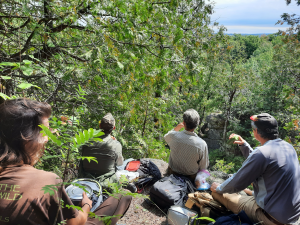1 A Vision of Relational Learning in a Post-Secondary Context
Our vision is to provide university students with transformative experiences that prioritize reconnecting with land and place through nature-based learning pedagogies. Our approach focuses on guiding students toward developing a respectful and meaningful connection with the living world.
This vision is rooted in relationships that acknowledge the deep interconnectedness of the living world with all facets of life. It embodies a ‘kin-centric’ worldview of the environment, emphasizing the importance of recognizing the living world as an integral member of our broader ecological family. Our commitment to respectful nature-based learning pedagogies and Indigenous ways of knowing also recognizes the historical harms inflicted upon Indigenous peoples through colonization. We are aware of the enduring impact of colonization on Indigenous communities, their cultures, and their sacred relationship with the living world. A fundamental aspect of our vision is to hold space for iterative and intentional learning that gestures towards addressing historical injustices. Embracing this vision, we aim to not only enhance the academic journey of students but also cultivate a profound sense of responsibility and respect for life and earth.
In our research (interviews and literature review), we identified five key themes in nature-focused education practices:
• fostering relationship building,
• empowering student agency,
• promoting critical reflection,
• cultivating cultural responsiveness, and
• centering Indigenous perspectives.
To integrate these themes into student learning, we as educators must support opportunities for reconnecting with land and ecology, navigating colonial histories and structures, empowering students as agents of change, fostering intersectional and interdisciplinary approaches, and advocating for institutional change.


Feedback/Errata